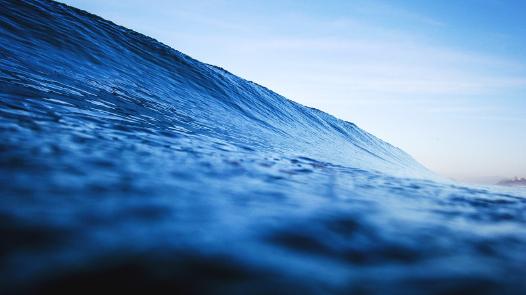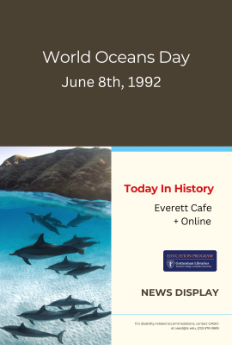Today In History: World Oceans Day

Timeless sea breezes,
sea-wind of the night:
you come for no one;
if someone should wake,
he must be prepared
how to survive you.
Timeless sea breezes,
that for aeons have
blown ancient rocks,
you are purest space
coming from afar...
Oh, how a fruit-bearing
fig tree feels your coming
high up in the moonlight.
-- Song of the Sea, Rainer Maria Rilke
With its vast eternal beauty, the sea in Rilke's lyrical poem evokes strength, inspiration, awe, and the transformative power of nature in helping humans reach a higher state of peace and prosperity. Akin to a wise, experienced teacher, the sea is also a reminder of our responsibility as caretakers of Earth whose surface is predominantly covered in water -- and whose oceans hold over 96% of it.
June 8th marks World Oceans Day and the theme for 2025 is "Wonder: Sustaining What Sustains Us." This annual observance was officially recognized by the United Nations in 2008, though it dates back to 1992, when Canada's International Centre for Ocean Development, and the Ocean Institute of Canada, attended the Earth Summit at the UN Conference on Environment and Development in Rio de Janeiro, Brazil. The goal of World Oceans Day is to raise awareness of the dangers faced by oceans and the continuing need for policies and processes that serve to protect and preserve their livelihood for the good of all life on our planet.
The following articles are drawn from Proquest Historical Newspapers, which informs and inspires classroom teaching and learning.
- Weisberg, B. (1992, Jun 09). The Overriding Importance of the Rio Earth Summit. Chicago Defender (Daily Edition) (1973-)
- Kennedy, M. (1996, Jun 08). Estuary Is Model for Saving Species. The Guardian (1959-2009)
- Island Nations Losing Ground to Oceans: Earth Summit Hears Global Warming Tales. (1997, Jun 25). Chicago Tribune (1997-)
- Grimaldi, A., & Clover, C. (2009, Jun 05). It's Not Too Late to Save the Tuna. Wall Street Journal (1923-)
- O'Carroll, E. (2009, Jun 08). Making Every Day Earth Day-- Literally. The Christian Science Monitor (1908-)
- Bush, L. (2011, Jun 06). A New Wave of National Parks. Wall Street Journal (1923-)
- Greenberg, P. (2015, Jun 14). Simple Rules for Seafood. New York Times (1923-)
- Graeber, L. (2016, Jun 10). World Oceans Weekend. New York Times (1923-)
- Whale Dies from Eating More than 80 Pieces of Plastic Rubbish. (2018, Jun 04). The Irish Times (1921-)
- Graeber, L. (2019, Jun 07). Stepping Up to Save the Seas. New York Times (1923-)

Tips:
- Intergovernmental Oceanographic Commission. et al. Oceans 2020 : Science, Trends, and the Challenge of Sustainability. 1st ed. Washington, DC: Island Press, 2002. e-book.
- Patton, Kimberley C. The Sea Can Wash Away All Evils : Modern Marine Pollution and the Ancient Cathartic Ocean. New York: Columbia University Press, 2007. e-book.
- Perdew, Laura. The Great Pacific Garbage Patch. 1st ed. Minneapolis, Minnesota: Essential Library, 2018. Curriculum ; GC1471 .P47 2018. e-book.
- Pontecorvo, Giulio, and William E Schrank. Fisheries Management : Pandemic Failure, Workable Solutions. 1st ed. Bingley: Emerald, 2009. e-book.
- Rafferty, John P. Oceans and Oceanography. Ed. by John P. Rafferty. 1st ed. New York: Rosen Educational Services, LLC, 2011. e-book.
- Smith-Llera, Danielle. Trash Vortex : How Plastic Pollution Is Choking the World’s Oceans. North Mankato, Minnesota: Capstone Press, 2018. Juvenile ; GC1090 .B87 2018.
Images:
- Blue Ocean Wave (Unsplash), Moonlight State Beach, Encinitas, United States, by Austin Schmid, Courtesy of Wikimedia Commons.
- Poster Image: Ocean with Dolphins, Courtesy of Canva.
Need to keep current, look to the past, teach a topic? The Everett Cafe features daily postings of news from around the world, and also promotes awareness of historical events from an educational context. Be sure to check additional Cafe News postings on the library blog.


